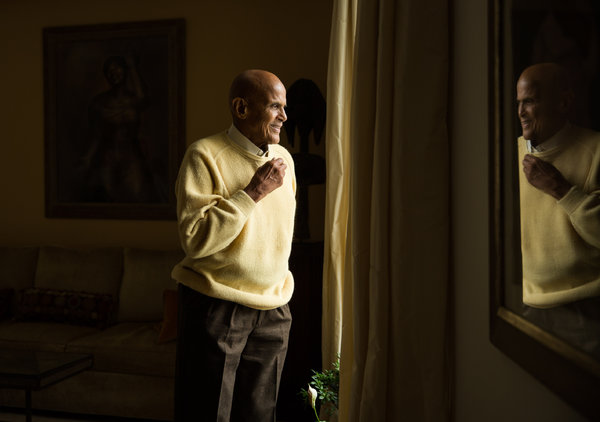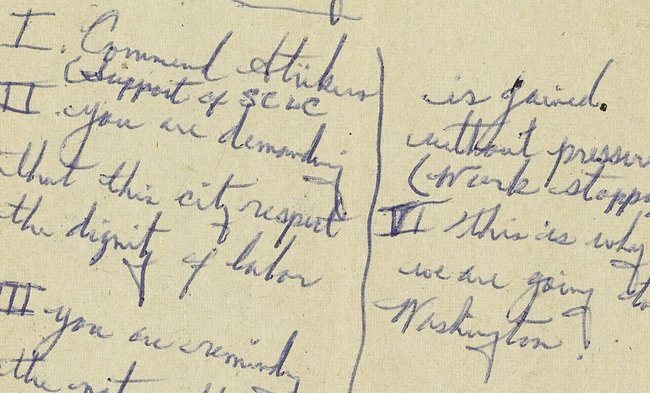October 15, 2013
Belafonte Sues Heirs
of Martin Luther King Jr.
Harry Belafonte is 86, an age that tends to focus the mind on putting one’s affairs in order. And that is why, Mr. Belafonte says, he has filed a lawsuit in federal court against the three surviving children of one of his closest friends: the Rev. Dr. Martin Luther King Jr.
Dr. King’s heirs — Dexter, Bernice and Martin Luther King III — have said the documents were taken without permission and belong to the estate.
Mr. Belafonte, who often supported the King family financially during the civil rights struggle, said the dispute pains him. He said in his view, Dr. King’s children had drifted away from their father’s values. “The papers are symbolic,” he said. “It’s really about what happened to the children, and I feel that somewhere, in this one area, I really failed Martin.”
One of the documents is a three-page outline for Dr. King’s 1967 speech “The Casualties of the War in Vietnam,” written on a legal pad in Mr. Belafonte’s New York apartment. The second is a letter of condolence from President Lyndon B. Johnson to Mrs. King. The third is an envelope Dr. King had in his pocket the day he was assassinated in 1968. On it he had scribbled notes for a speech he was to give in Memphis.
In December 2008, Mr. Belafonte tried to sell the documents at Sotheby’s auction house to raise money, he says, for Barrios Unidos, a charity that works with street gangs. Before the sale could go forward, however, Dr. King’s estate challenged Mr. Belafonte’s ownership of the papers that same month, charging in a letter to Sotheby’s that they are “part of a wrongfully acquired collection.”
Since then, the documents have been in limbo, sitting in the auction house’s storage vault while attempts to settle the dispute out of court have failed. Under state law, Sotheby’s faces liability to the actual owner if it releases property to the wrong party, and so has refused to return the documents to Mr. Belafonte until the dispute is settled.
On Tuesday, Mr. Belafonte filed papers in federal court in Manhattan asking a judge to declare him the rightful owner.
William B. Hill, a lawyer for the King estate, did not return telephone calls seeking comment. A spokeswoman for Bernice King, Bunnie Jackson-Ransom, said Ms. King had no comment on Mr. Belafonte’s suit. Messages left for the spokesman at the King Center in Atlanta, where Ms. King is chief executive, got no response. The King family has a history of suing to protect its right to Dr. King’s works and images, and they have also aggressively sought to recover Dr. King’s documents.
In 1986, Mr. King’s widow sued Boston University in an effort to regain control of about 83,000 documents that Dr. King had given it in the mid-1960s. (Dr. King received a Ph.D. from Boston University.) She lost in court.
More recently, in September 2011, the estate sued to stop Dr. King’s former secretary, Maude Ballou, from selling about 100 documents, notes, letters and speeches in her possession. Mrs. Ballou, who is 88, and her son, Howard Ballou, maintained that Dr. King had given her the items in the late 1950s when she worked for him. A federal judge in Jackson, Miss., ruled that the King family had no evidence that Mrs. Ballou had improperly obtained the papers, and that the statute of limitations for reclaiming them had long passed. A federal appeals court in New Orleans upheld the decision in March.
Mr. Belafonte’s lawyer, Jonathan Abady, said the King estate has never presented evidence that Mr. Belafonte stole the documents. What’s more, the three-year time limit for filing a suit in New York to reclaim them has passed, he argued.
“We were left with no choice but to seek relief from the courts,” Mr. Abady said. “And, whatever rights the King children have, they are not entitled to undo the wishes and actions of their parents.”
Mr. Belafonte’s ties to Dr. King’s children started to fray in 2006, when Mrs. King died, and her children did not invite him to her funeral because of his support for President Hugo Chávez of Venezuela.
That same year, the family arranged to sell about 10,000 of Dr. King’s sermons, speeches, letters and other papers through Sotheby’s. The sale was called off at the last minute, when the City of Atlanta bought the collection for $32 million and gave it to Morehouse College, Dr. King’s alma mater.
According to the complaint, Mr. Belafonte said Dr. King often stayed in Mr. Belafonte’s Manhattan apartment during the 1960s and held meetings there with advisers. Dr. King wrote the outline of the Vietnam speech during one of these sessions in 1967 and then left it with Mr. Belafonte after he composed an early draft of the speech itself.
The notes for the Memphis speech — the last words Dr. King put to paper — were left as a bequest to Mr. Belafonte by the close King aide Mr. Levison, who died in 1979, the complaint said. Mr. Belafonte said Mrs. King had first tried to give him the notes in the turbulent days after the King assassination, but he urged her to give them to Mr. Levison instead.
Mr. Belafonte said Mrs. King had given him the condolence letter, sending it to him in 2003.
Taylor Branch, a historian who wrote a trilogy of books on Dr. King, said the documents are of little value to scholars but have great value as memorabilia. He called the family’s attempt to wrest the items from Mr. Belafonte “sad to the point of tragedy.”
Clarence B. Jones, Dr. King’s lawyer and close friend, said the King family had every right to protect its copyright. Still, he said the heirs’ attempt to recover documents from Mr. Belafonte was “inconsistent with, and, really, a denigration of, the love and integrity that their dad had for the people who worked with him.”
“Harry Belafonte is not just another person,” he said.
>via: http://www.nytimes.com/2013/10/16/arts/belafonte-sues-the-king-family.html?hpw&pagewanted=all


